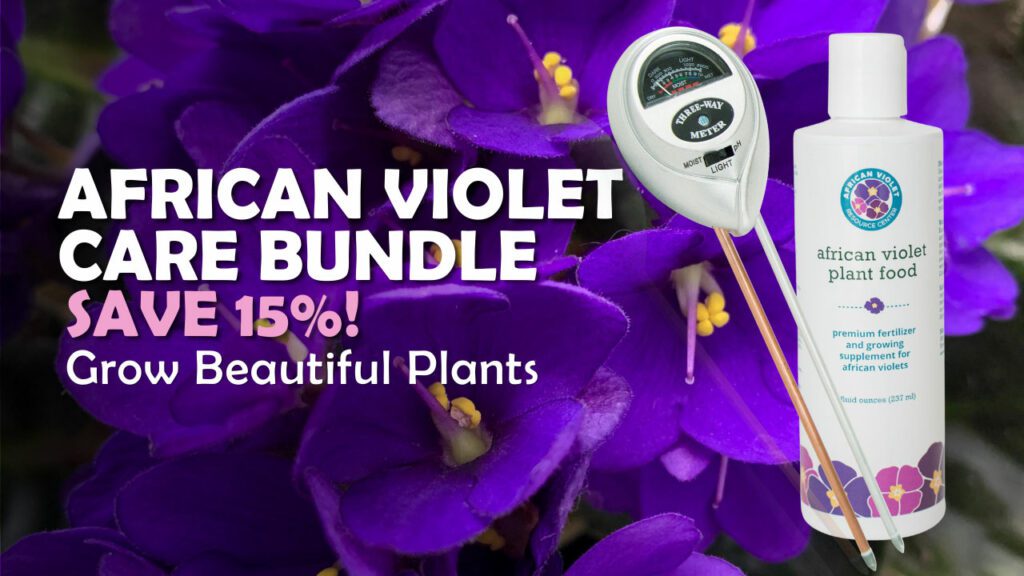For generations, African violets have been a favorite of houseplant lovers. If you are looking to start or expand your collection, there are many beautiful options to choose from.
Most African violets are started from cuttings or from dividing plants. However, it is possible to grow African violets from seeds. This takes about the same amount of time as starting from cuttings, but you’ll get more plants from seeds than you would from propagating cuttings.
You’ll also get a greater variety of African violets if you start from seed than if you start from cuttings. When you start an African violet from a cutting, the baby plant is the same as the parent plant. However, seeds are formed by cross-pollinating two plants. For most varieties, there is no guarantee that the resulting seeds will grow into the same types as the parent plants.
Instead, you can get vastly different-looking African violets from seeds even when those seeds come from the same seed pod. This makes starting African violets from seeds a surprising and rewarding experience.
Keep reading to learn how to start African violets from seeds and how to ensure healthy, thriving plants.
Are African Violets Easy to Grow?
African violets are such a popular houseplant because they are so easy to grow. While you can’t completely neglect African violets, they are very forgiving, and they thrive in the low-humidity and medium-temperature environment that most homes provide.
In fact, with just a little care, African violets can thrive for years. Once you begin having success with one or two African violets, you’ll find yourself looking to get even more. The only thing that African violets are finicky about is the number of hours of light that they get.
I sometimes accidentally neglect my indoor houseplants for a few days when life gets hectic, but unlike my other houseplants, my African violets have never seemed to notice. African violets are relatively low-maintenance, which makes them a great choice for everyone with an open spot in a sunny room.
If you are planning to grow African violets from seed, you’ll be relieved to know that they are also relatively easy to grow from seed. While they do require a little more attention during the germination stage, starting African violets from seed is not a difficult or complicated task.
Learn more about caring for African violets: 5 Growing Tips to Consider Before You Buy an African Violet Plant
Where Can I Buy African Violet Seeds?
If you want to start African violets from seed, it’s easier to buy from a reputable seller than to try to collect seeds from your own plants. Generally, you will need to order African violet seeds online as big-box garden centers and local retailers are unlikely to carry seeds (although they are likely to have a selection of potted African violets already growing).
African violets have to be hand-pollinated to produce seeds indoors. While you could carefully pollinate your own plants, the process does not always work. You would have to wait to see if your attempt at pollination resulted in a seedpod, and even if you were successful, it takes months for the seedpods to mature.
African violets do not produce seeds that look exactly like the parent plants. However, a reputable seller will test the seeds produced from a specific cross-pollination, and they will advertise the general type of African violets that the mix produces.
A good seller will also separate seeds before selling to the customer. When African violet seedpods are opened, there are two kinds of seeds: fluffy, failed seeds that will not germinate and plump seeds that are more likely to germinate. By separating out the failed seeds, good sellers ensure that more of your seeds will germinate.
Propagating African Violets From Seed
Starting African violets from seed is exciting because you will get many different kinds of African violets, unlike with propagating from cutting where you will get a clone of the parent plant.
Starting African violets from seed is less common than taking a cutting, but starting from seed takes about as long as starting from a cutting. You’ll have blooms around the same time regardless of which method you use, so there’s no reason not to try starting from seed, especially if you are looking to expand your African violet collection.
How Do You Start an African Violet?
Now that you’ve decided that you’re interested in growing African violets from seed, let’s talk about what you need to do to make that happen.
Step 1: Gather your materials.
Here’s what you need to start an African violet from seed.
- African violet seeds
- Growing medium (either an African violet potting mix or a seed-starting mix containing coir)
- Small containers
- Tap water
- Piece of paper (about the size of an index card)
- Plastic wrap or a lid
Step 2: Prepare the growing medium.
Before sowing your seeds, you need to adequately moisten the growing medium. Add tap water to your growing mix until it is moist, but not soaking wet. Add a few tablespoons of water per cup of growing mix.
Place the mix into your container (or containers). Aim for at least a ½ layer of growing mix. Gently smooth out the surface of the growing mix, but don’t compact the mix too much.
Step 3: Sow the seeds.
African violet seeds are very tiny and can be difficult to pick up individually, which is where the piece of paper comes in handy. Carefully tap some of the seeds from their envelope onto a piece of paper. Attempt to evenly spread the seeds across your container by tapping on the paper as you move it across the container.
The paper gives you a little more control than dumping the seeds straight from the envelope, but you still probably won’t end up with perfectly even spacing.
Not all of the seeds that you sow will germinate, so sprinkling in a few extra is not a bad idea.
Step 4: Create a humid environment.
Once the seeds are in the container, you need to ensure that the environment stays humid. If you have a clear plastic lid for your growing container, place that on top of the container. If not, use plastic wrap or a plastic bag to cover the container and keep the growing mix from drying out.
The cover should keep the mix from drying out, but if you notice that conditions seem to be dry inside the container, then take off the cover and mist the growing mix with more water.
Step 5: Keep the seeds at optimum temperature and light levels.
African violet seeds germinate best in environments between 70 to 80 degrees Fahrenheit (21 to 27 degrees Celsius). The majority of households fall within this range, but make adjustments to ensure that your seeds stay at this temperature if you have them in a spot that is typically warmer or colder than this ideal temperature.
The seeds need about 10 hours of light a day to germinate. You can either place the containers in a window that receives indirect light for this amount of time each day, or you can use artificial lights to provide enough light to start germination.
To use artificial light, place a fluorescent light on a timer about 10 inches above the top of the seeds. You can purchase lights that are specifically advertised as grow lights, but fluorescent lights will work in the same way. Seeds grown with artificial lights generally start faster due to consistent light, but it is not absolutely necessary to use artificial lights if you have a spot that receives indirect sunlight for 10 hours a day.


How Long Does it Take for African Violet Seeds to Germinate?
The germination period for African violets differs depending on temperature and light conditions. However, in most cases, you should begin seeing minuscule green seedlings peeking out of the growing mix after about 14 days.
All the seeds develop at different times. While you may see the first seeds sprouting after 2 weeks, some of the seeds may take 4 weeks to begin germinating. A few may not sprout until week 5 or so.
Be aware that not every African violet seed germinates. This is normal. You’ll have higher germination rates when environmental conditions are ideal, but even then you’ll end up with fewer plants than the number of seeds that you originally started with.
If you are a houseplant lover who likes quick progress, you’ll need patience during this time. African violets seem to start off impossibly slow, but their growth speeds up after some time. It’s worth the wait.
You’ll get slightly faster results if you keep the seeds in an ideal environment (70 to 80 degrees Fahrenheit and 10 hours of light a day), but African violets are going to take the time that they need to develop before rewarding you with gorgeous blooms for years to come.
In fact, once African violets begin blooming, they can continue blooming nearly continuously indoors as long as the environmental conditions remain right. You just need to have patience while they are maturing.
How Long Does it Take to Grow African Violets From Seed?
African violet seeds start small and seem inclined to stay small for a while. You can begin transplanting them from the container that you started them in as soon as they are large enough for you to maneuver them out of their container. However, there is no rush to transplant them if they seem to have enough space and be content where they are.
When you do decide to transplant, make sure that you use an African violet potting mix. Regular potting soil is too dense and retains too much water. This can cause your plant’s roots to rot. After putting effort into growing new African violets, you don’t want to lose them halfway through the process.
Choose a small pot to encourage African violets to bloom. They do not do as well in giant planters, and transplanting into large containers that are too big could slow down how quickly you see the first flowers on your African violets.
Generally, you should expect to see the first blooms on African violets grown from seeds 6 to 9 months after sowing. The time that it takes depends on the environment. African violets with proper amounts of watering, light, and temperature tend to develop sooner.
You can give your African violets a boost by applying gentle houseplant food on a weekly basis. Indoor plants need supplemental nutrients because they cannot pull nutrients from the soil in the same way that outdoor plants are able to.
Some people also find that African violets seem to thrive if they are regularly repotted from small containers to increasingly larger containers while still maturing (for example, moving from a 1-inch pot to a 2-inch pot). However, other people have not noticed the same results from potting up seedlings as regularly.
The time that it takes African violets to grow from seed is roughly the same as the time that it takes African violets to grow from cuttings. If you are considering starting African violets from seed, give it a try. You’ll get to enjoy a delightful surprise when you see the first blooms.
What else would you like to know about growing African violets from seeds? Do you have any tricks for getting seeds to germinate? Start a conversation in the comments below!
Join the African Violet Club!
Whether you’re just starting out or are a seasoned grower, African Violet Resource Center has everything you need to help your plant grow vibrant and strong. Explore our other articles, visit our online shop, and connect with other houseplant lovers in our Facebook group to learn everything you need to know about this rewarding hobby!
More Great African Violet Resources
Where to Buy African Violet Plants & Products
The Perfect African Violet Potting Soil Mix





